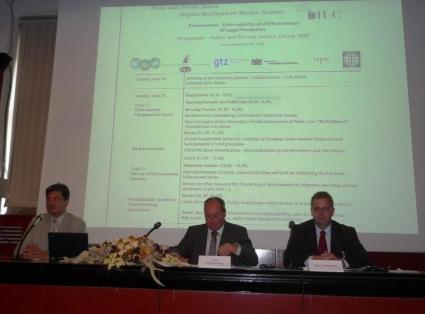The Liberal Judicial Officer in Question in Croatia
The UIHJ took part in the international symposium which was held from 24 to 29 May 2009 at the inter-University center of Dubrovnik, organized by the Faculty of Law of Dubrovnik, within the framework of its 2009 training program on civil justice
Opening of the International conference
Topics Centered on Enforcement
The international character of the demonstration was due to the collaboration of the UIHJ, the Dutch organization International Center for Legal Co-operation (CILC), of GTZ, a German Consortium, and the Royal Organization of the Judicial Officers of the Netherlands. The UIHJ was represented by its 1st secretary, Mathieu Chardon, and by its 1st quaestor, Jos Uitdehaag. The general topic of the conference was “Enforcement, enforceability and Effectiveness of legal Protection”.
Many speakers followed one another on the floor during the four days of this conference where topics mainly centralized around enforcement: general principles of enforcement, history of enforcement systems, main enforcement systems in Europe, enforcement and process of European integration, enforcement of legal decisions in the countries in transition, standards for an effective enforcement, etc.
One must greet the perfect organization of this conference, thanks to the good care of his coordinator, Alan Uzelac, law professor at the Faculty of Law of Zagreb. Among the participants were three members of the Scientific council of the Legal Institute of international judicial law and enforcement law of the UIHJ (IDJPEX), in the person of Burkhard Hess, professor at the Law Faculty of Heidelberg (Germany), Ton Jongbloed, professor at law at the Faculty of Utrecht (the Netherlands), and Vladimir Yarkov, professor at the Faculty of Law of Yekaterinburg (Russian Federation). Professor Hess intervened on the topic of the enforcement systems in Europe. Professor Yarkov, via one of his assistants, Vadim Abolonin, presented the enforcement system in force in the Russian Federation.
The European Commission for the Efficiency of Justice of the Council of Europe (CEPEJ) also took part in the conference. It was represented by its vice-president, John Stacey, who intervened on the procedure of “Small Claims” in England and Wales. Mathieu Chardon made two presentations, one on the training of judicial officers, the other on the importance of standards relating to enforcement. Jos Uitdehaag, very involved in the Balkans Enforcement Reforms Project (Berp project), treated the recommendation of the Council of Europe Rec (2003)17 of 9 September 2003 on enforcement. He also spoke about the standards of quality and complaints.
Eric Vincken exposed the broad outlines of the BERP project he is in charge of. John Marston, judicial officer in Walsall (England), former chair of the Association of High Court Enforcement Officers, explained the principal tariff systems into force in the profession. He also attempted to compare the various economic models of the judicial officers in England and Wales.
Profitable Reforms
The conference also allowed several so-called countries in “transition” to intervene, such as the Russian Federation, Serbia, Albania, Montenegro, Slovenia, Croatia, Bosnia and the Former Yugoslav Republic of Macedonia (FYRO-Macedonia). Regarding this last country, Antonio Kostanov, president of the recently created National chamber of the judicial officers, indicated how the reforms had intervened to lead to creation in his country of a liberal judicial officer and how much - figures and statistics at hand - they were beneficial for the public service of justice and the interest of the citizens.
A representative of the ministry for justice of Croatia also came to present the work in progress in Croatia while Alan Uzelac drew a picture of the advantages to entrust enforcement of legal decisions to liberal judicial officers. In this respect, it seems from now a fact that this country, in its indefectible will to join the European Union as soon as possible, moves unrelentingly towards the installation of such a professional, as seems to prove the entire object of the Dubrovnik conference.


